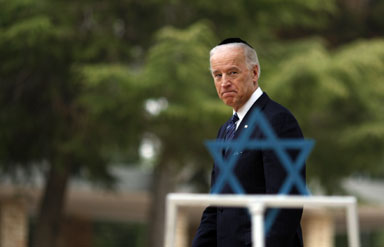Published: march 25, 2010; A further note on U.S.-Israel relations.
by Barry Rubin,
A Further Note on U.S.-Israel Relations.
A lot of nonsense has been written about the Obama Administration seeking or deliberately creating a crisis in U.S.-Israel relations. This has little or nothing to do with the actual events:
1. The crisis began with the announcement by a low-level Israeli committee about the future construction of apartments in east Jerusalem (yes, we know it wasn’t deliberate, etc.) at the very moment when Vice-President Joe Biden was in the city and indirect Israel-Palestinian Authority talks were about to begin.
2. The U.S. government didn’t seek a crisis, it neither planned nor wanted this problem.
3. The crisis gave the PA the excuse to walk out of negotiations the U.S. government had spent months in organizing. Without these indirect talks the administration looks like a fool.
4. The White House should want to keep the Israel-Palestinian issue relatively quiet and be willing to accept the appearance of progress without its reality. The U.S. government should want to keep its emphasis on Iraq, Afghanistan, and sanctions on Iran (which are about to be its next big failure).
In short, what should the Administration prefer:
A. A big mess with Israel that makes it look stupid and incompetent, ticks off a lot of Congress against the White House, kills the indirect negotiations which would be the only thing it has to show after fifteen months in office, and gives the PA a chance to wriggle out once again of doing anything.
Or
B. A nice start to (meaningless but only we know that) indirect Israel-Palestinian talks with Obama looking like a great statesman, presiding over a lot of back and forth; the U.S. government says to the Arabs, see we are making great progress on peace; and telling the American people, You see! We are having lots of foreign policy successes.
BUT that is a rational analysis of the situation from the standpoint of a mainstream American presidency. Does the Obama administration want to be in that category or to pursue an ideological vendetta against Israel, bucking Congress, public opinion and U.S. interests?
On this choice will rest the future of the Obama administration much more than that of Israel or the Middle East.
Hillary Clinton’s AIPAC speech: find the glaring contradiction.
published: march 22, 2010; Hillary Clinton’s AIPAC speech: find the glaring contradiction.
Watch the video and read the transcript of Secretary of State Hillary Clinton’s speech at the AIPAC Policy Conference 2010, here.
by Barry Rubin
When policymakers say things that are in blatant contradiction, there is something wrong with their world view and strategy. Yes, political leaders often say contradictory things–often they have to do so–but it is not supposed to be too obvious.
In her speech to AIPAC, Secretary of State Hillary Clinton criticized and equated two things. On one hand, there is the Palestinian “culture of hate” which spouts “incitement” to murder Jews. The other is Israeli settlement construction. These problems, Clinton adds, “undermines America ’s unique ability to play a role” in the peace process.
Have you found the glaring contradiction? You could say, if you wished, that one cannot equate “hate speech” (to use the common terms for such things nowadays) urging killing with building settlements. I am, however, willing to accept that equation from a U.S. policy standpoint.
What is unacceptable, however, is the point that every reporter and observer should be making: The United States, as we have seen recently, is willing to attack construction on settlements (even construction the administration has previously agreed to let happen!) at the highest level and in the loudest voice. It is willing to make this issue the number one issue in the world, a basis for pressuring Israel and verbally attacking it.
I have yet to hear a single word spoken by this administration on the subject of the bloodthirsty incitement to murder that goes on every day. For this incitement not only produces violence a lot more directly than construction on settlements (which also provides stability by employing thousands of Palestinian workers), it also prevents progress toward peace.
The Palestinian Authority’s failure to undertake any educational or media campaign in 16 years to promote compromise with Israel has been almost completely ignored in the West. And while such an effort wouldn’t be easy, only by building a public base of support for compromise and conciliation could the Palestinian Authority (even if it wanted to do so) make peace with Israel.
Bashing Israel over construction on settlements while doing absolutely nothing about Palestinian Authority incitement is not going to persuade Israelis of the administration’s credibility or make any advance toward peace. Forget about asking this administration for a “pro-Israel” policy, how about just having a truly evenhanded policy?
About the author,
Barry Rubin is director of the Global Research in International Affairs (GLORIA) Center and editor of the Middle East Review of International Affairs (MERIA) Journal. His latest books are The Israel-Arab Reader (seventh edition), The Long War for Freedom: The Arab Struggle for Democracy in the Middle East (Wiley), and The Truth About Syria (Palgrave-Macmillan). His new edited books include Lebanon: Liberation, Conflict and Crisis; Guide to Islamist Movements; Conflict and Insurgency in the Middle East; and The Muslim Brotherhood.



 RSS
RSS











A further note on US-Israel relations #israel #jcot http://j.mp/c6QSxZ
A further note on US-Israel relations #israel #jcot http://j.mp/c6QSxZ http://ff.im/ibbIS
RT @CrethiPlethi: A further note on US-Israel relations #israel #jcot http://j.mp/c6QSxZ
[…] This post was mentioned on Twitter by Elisabeth, Crethi Plethi. Crethi Plethi said: A further note on US-Israel relations #israel #jcot http://j.mp/c6QSxZ […]
RT @CrethiPlethi: A further note on US-Israel relations #israel #jcot http://j.mp/c6QSxZ http://ff.im/ibbIS